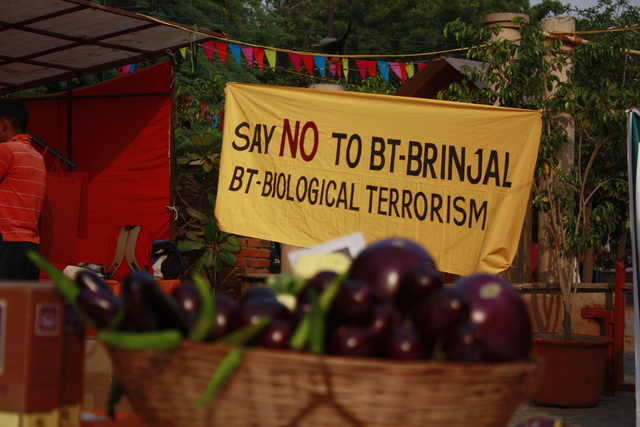In India, the debate about the benefits and threats of the spread of genetically modified (GM) crops has hit a new peak: Yesterday, 150 scientists submitted a letter to the Minister of Environment and Forests urging her to keep in place the three-year old moratorium on the commercial release of Bt Brinjal, an eggplant variety that was modified for greater pest resistance by inserting a gene from the soil bacterium Bacillus thuringiensis. Bt Brinjal was originally supposed to be commercially introduced in 2009, but public outcry led to the moratorium currently in place.

In what amounts to a battle between science and politics, the scientists denounced an affidavit given to the Supreme Court by the agricultural ministry in which the ministry had stressed the importance of yield increases through GM technology in assuring food security and had criticized the stance of the Technical Expert Committee of recommending a 10 year moratorium.
According to the scientists’ letter, “Food security is not just a problem of production, but also of distribution and access or purchasing power. Today, there are 320 million hungry Indians and paradoxically, the godowns [warehouses] are overflowing and the food grains are rotting. … In India and overseas, a majority of the hungry ironically partake on the production of food. Hunger is obviously a more multi-faceted problem than what can be solved using a particular kind of seed or chemicals.”
They then went on to advise the Ministry to rather focus on low-input agro-ecological alternatives.
This news story is a great reminder of the multi-faceted field that is food policy. While I was originally critical of the scientists’ blanket statement that “there is no link between yield increases and food security,” they made an interesting case in putting the spotlight on the USA, where GM crops are most widespread, food is being produced on a massive scale and yet, every sixth American (50.1 million) live in food-insecure households. While I would still maintain that yield increases can contribute to food security if the root cause for food insecurity is lacking production, in focusing on the current situation in India the authors of the letter put forward a powerful argument: according to them, at this point in time, enough food is being produced, but it is the widespread poverty that bars people access to it and causes them to be hungry – an idea first put forward by another Indian, Amartya Sen, and which since has been included in the mainstream definition of food security. From socio-economic theory to concrete political argumentation and decision-making – full circle.
Top image by Alice Henneman via Flickr CC.
.
0 thoughts on “GM Crops – Vital for India’s Food Security?”